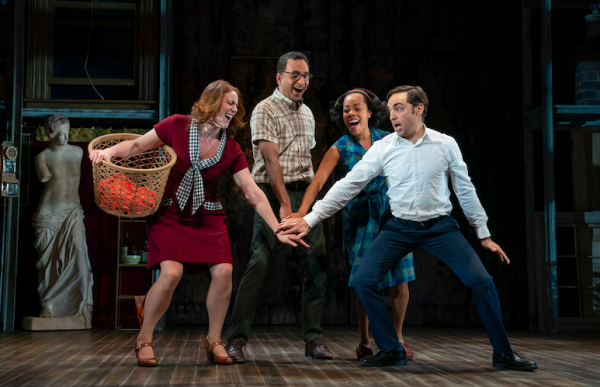Merrily We Roll Along has a special place in the canon of Stephen Sondheim musicals. The original 1981 Broadway production followed what many considered to be the greatest of the legendary composer-lyricist’s collaborations with director Harold Prince, Sweeney Todd. Unlike its blood-and-guts predecessor, Merrily was a quick flop, running for 44 previews and only 16 regular performances. The misfire ended the Sondheim-Prince partnership and attained cult status as a “If-only” show. Aficionados claim it could have been a hit if only George Furth’s book were stronger, if only Prince’s direction hadn’t been as cluttered, if only audiences were more sophisticated and appreciative of Sondheim’s heavenly score.
Riding on the strength of these caveats, Merrily has been reborn in several variations—Off-Broadway, London, regional theater, concert form and concept album—with cut songs restored, and book material added and subtracted. Yet the perfect version remains stubbornly elusive. Even the latest attempt, presented by the clever Fiasco Theater at Roundabout’s Laura Pels Theater, falls short despite many improvements and arresting moments.

Credit: Joan Marcus
The main problem is the basic concept. Based on George S. Kaufman and Moss Hart’s 1934 comedy of the same name—also a short-lived curiosity—Merrily follows the fortunes of three show-biz friends in reverse chronological order from jaded disillusion in 1980 to naive optimism in 1957. Heartbreak and betrayal arrive early with gut-wrenching renditions of such Sondheim gems as “Not a Day Goes By,” “Like It Was,” and “Good Thing Going,” but with no context or build-up their emotional impact is slight. In addition, the libretto by Furth is witty but one-dimensional. In the world of the show, you are either money-grubbing and shallow or noble and above commerce. There is no in between. Frank, the corrupted composer, is a lascivious bounder once the success bug bites while his lyricist-playwright partner is unbelievably pure and self-righteous, both emotionally and artistically. Their pal Mary, a promising novelist, becomes a self-pitying alcoholic—and worse a film critic!—all due to her frustrated love for Frank. All this happens backwards which adds to the confusion and lack of audience connection.
Despite the material’s inherent flaws, there is much to relish in this sleek, pared down staging by Noah Brody, who co-directed Fiasco’s similarly bare-bones yet delightful revival of Sondheim’s Into the Woods at Roundabout in 2015 with Ben Steinfeld who now plays Frank. On Derek McLane’s evocative backstage set crammed with theater memorabilia from the decades depicted (including a marquee of the Alvin Theater where the original production played), Steinfeld and five other actors play all the roles with dexterity while the sequences flow seamlessly from Hollywood to Broadway to a Greenwich Village club to a tenement rooftop where the protagonists first express their dewey dreams and we know they’ll all be crushed. Time passing in reverse is succinctly conveyed in subtle means such as Mary reverting from heavyset drunk to trim twenty- something by removing layers of period dresses (Paloma Young and Ashley Rose Horton designed the period-catching costumes).

Credit: Joan Marcus
The small cast delivers Sondheim’s gorgeous and complex melodies with honesty and flair. They also manage to endow the slender characters with all the believable passion Furth’s dialogue lacks. Steinfeld captures Frank’s insecure hunger for fame and money while still conveying his charm. Manu Narayan makes Charlie’s smug, purist anger compelling particularly in the showpiece “Franklin Shepard, Inc.” where he tells off Frank on a TV interview show. Jessie Austrian gives Mary a cutting humor as well as a aching heart. Brittany Bradford stunningly rips into “Not a Day Goes By” as Beth, Frank’s estranged wife. Paul L. Coffey finds snap and bite in a variety of roles including the smarmy producer of Frank and Charley’s Broadway musicals. Emily Young nearly steals the show as the selfish Gussie, an ambitious actress out to steal Frank from his old friends. She takes the reverse journey from broken wife to attention-grabbing diva to innocent secretary, endowing each phase of Gussie’s backward evolution with detail and brio.
Merrily remains the problem child of Sondheim’s creations, but it does contain one of his loveliest scores, a bracing reminder of the composer’s softer side with its delicate yearnings for child-like idealism and an unspoiled love of the stage. So it’s a welcome visit despite the shortcomings.
Feb. 19—April 9. Fiasco Theater/Roundabout Theatre Company at the Laura Pels Theater/Harold and Miriam Steinberg Center for Theater, 111 W. 46th St., NYC. Tue 7:30pm, Wed 2pm & 7:30om, Thu—Fri 7:30pm, Sat 2pm & 8pm, Sun 3pm. Running time: one hour and 40 mins. with no intermission. $99—$149. (212) 719-1300. www.roundaboutheatre.org.
